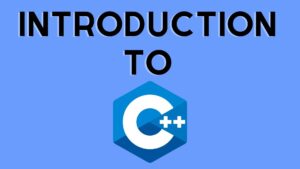Here are some of the features of the C++ language:-
- OOP (Object-Oriented Programming)
- Platform or Machine Independent
- Simple
- High-level programming language
- Popular
- Case sensitive
- Compiler-Based
- DMA (Dynamic Memory Allocation)
- Existence of Libraries
- Speed
OOP (Object-Oriented Programming)
Unlike C, which is a procedural language, C++ is an object-oriented language. C++ has this as one of its most important features. When programming, it makes use of objects. These objects help in the implementation of real-time problems involving data abstraction, encapsulation, data hiding, and polymorphism. All five major concepts of object-oriented programming have been briefly explored.
The OOP concepts are:
- Data abstraction: It is the act of describing the most relevant properties of data without providing background information or the method used to collect it.
Data encapsulation: Data encapsulation is the process of implementing data abstraction by wrapping data and functions into a single block. - Inheritance refers to the process of transferring the properties of the parent class to the child class. We can put the basic idea of inheritance into practice by creating multiple classes, which we formally refer to as derived classes, and linking them to what we call the base class. This concept reduces program redundancy and makes it simple to transfer/copy the properties of one class to another.
- Data hiding Protecting data from unauthorized access is referred to as data hiding. It is primarily in charge of data security. It’s vital to distinguish data encapsulation from data hiding since encapsulation focuses on refocusing attention on important data rather than explaining its complex nature.
Polymorphism is derived from the words poly (many) and morphism (forms). Polymorphism, as the name suggests, refers to the display of data in multiple ways.
Platform or Machine Independent
Although C++ is platform-independent, compiled applications written for one operating system will not execute on another.
In other words, portability refers to the ability to use the same piece of code in different settings.
Let’s look at an example to better grasp this C++ feature. Let’s say you build a piece of code in Microsoft Windows to find an employee’s name, age, and salary, and then you decide to move to LINUX for some reason. This code will function in the same way that it did in Windows.
Simple
We expect to fully comprehend a new language when we first learn it. C++ appeals to programmers who are ready to learn a new programming language because of its straightforward context.
If you’re already comfortable with C, you won’t have any problems transitioning to C++. C++ has a syntax that is almost identical to that of C. After all, C++ stands for “C with Classes.”
High-level programming language
It’s important to note that C++ is a high-level programming language, as opposed to C, which is a mid-level language. It is easier for the user to work with C++ as a high-level language since it is closely related to a human-comprehensible language, namely English.
Popular
After learning C, you’ll be able to use it to write in a variety of other popular programming languages that allow object-oriented programming. Bjarne Stroustrup chose to create C++ after discovering Simula 67, the first object-oriented language, lacked simulations.
Case sensitive
The capital and lowercase characters are treated differently in the C++ programming language, just as they are in C. The meaning of the keyword ‘cout’, for example, differs depending on whether it is written as ‘Cout’ or “COUT.” Other programming languages, such as HTML and MySQL, do not care about cases.
Compiler-Based
C++ is a compiler-based language, unlike Java and Python, which are interpreter-based languages. As a result, it is substantially quicker than Python and Java.
DMA (Dynamic Memory Allocation)
Because C++ allows us to use pointers, we can dynamically allocate memory. When working with classes and objects in C++, we can even employ constructors and destructors.
Existence of Libraries
The C++ programming language comes with a built-in library of functions that make life easier for programmers. By providing the appropriate header files, these functions can be accessible.
features of c plus plus,
Speed
As previously said, C++ is a compiler-based programming language, which means it is significantly faster than interpreter-based programming languages like Python and Java.
We hope that this article will assist you in understanding all about the features of c++. We have concentrated on making a basic, meaningful, and easy-to-learn guide to the concepts. Still, if you have any problems regarding this, please post them in the comment section, we will be glad to assist you.
features of c++, features of c++, features of c++, v,features of c++ features of c++, features of c++, features of c++ ,features of c++ ,features of c++ features of c++ features of c++ features of c++ features of c++
You might like:




Pingback: C++ Basic Syntax | C++ Tutorial - Developers Dome
Pingback: Variables in C++ - Developers Dome
Pingback: Input and Output in C++ | C++ Programming - Developers Dome
Pingback: While and do...while loop with Example | C++ Programming